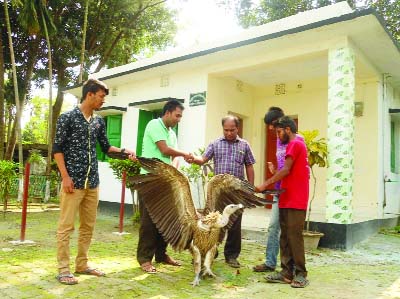
BSS, Rajshahi :
Eco-friendly rat management can be the vital means of protecting many beneficial insects together with maintaining a sound environment.
Scientists and other researchers concerned revealed that the farmers destroy various species of the insects during the time of eliminating the destructive ones due to lack of adequate knowledge in this regard.
In order to address the adverse situation to some extent, a rat management sub-project titled “Integrated rodent management in wheat and rice through eco-friendly control techniques” is being implemented here.
Vertebrate Pest Division of Bangladesh Agricultural Research Institute (BARI) is executing the project in Paba, Puthia and Durgapur upazilas of Rajshahi district with financial support of National Agriculture Technology Project of Bangladesh Agricultural Research Council (BARC).
Jahedul Islam, Scientific Officer of On-farm Research Division of BARI, said farmers conventionally apply rodenticide killing many non-target beneficial animals and birds.
He, however, said the project encourages the farmers towards using trap with applying a little amount of rodenticide to control rat in environmental friendly means only when necessary.
If this method is practiced properly, about cent percent desired result can be attained.
Matiur Rahman, a wheat farmer of Shibpur village under Puthia upazila, said the new rat control method is helpful to control rat without killing and injuring beneficial animals and insects.
Another farmer Abdul Malek of Dharampur village under Durgapur upazila said a comprehensive approach needs to be adopted to conserve the beneficial insects in the greater interest of maintaining biodiversity and ecological balance.
Dr Shah Alam, Principal Scientific Officer of BARI, told BSS that rat is a serious threat to agriculture of the country.
It causes wheat damage up to 77,000 tonnes and rice 80,000 tonnes every year. The total loss of rice and wheat may be up to Tk 700 crore. Not only field crop, it causes considerable losses to store products.
Dr. ATM Hasanuzzaman, principal investigator of the project, opined that not a single method is effective for rat management. Integration of several techniques can be more effective for rodent control successfully.
He said this new rat control method is eco-friendly and farmer can be economically benefited by using the techniques.
Another salient feature of the project is the farmers can control rat successfully in entire field on a community approach basis.
This is really a useful and efficient method. Highly rodent affected farmers of rice and wheat crops can get good results by using the method.
Prof Dr Bidhan Chandra Das of Department of Zoology in Rajshahi University says all insects are not harmful for the crops but the chemical pesticides or insecticides are more or less dangerous for both human health and other beneficial insects.
He, however, says the destructive as well as the injurious insects can easily be controlled through promoting eco- friendly method of using organic fertilizer and indigenous insecticides instead of chemical ones.
Eco-friendly rat management can be the vital means of protecting many beneficial insects together with maintaining a sound environment.
Scientists and other researchers concerned revealed that the farmers destroy various species of the insects during the time of eliminating the destructive ones due to lack of adequate knowledge in this regard.
In order to address the adverse situation to some extent, a rat management sub-project titled “Integrated rodent management in wheat and rice through eco-friendly control techniques” is being implemented here.
Vertebrate Pest Division of Bangladesh Agricultural Research Institute (BARI) is executing the project in Paba, Puthia and Durgapur upazilas of Rajshahi district with financial support of National Agriculture Technology Project of Bangladesh Agricultural Research Council (BARC).
Jahedul Islam, Scientific Officer of On-farm Research Division of BARI, said farmers conventionally apply rodenticide killing many non-target beneficial animals and birds.
He, however, said the project encourages the farmers towards using trap with applying a little amount of rodenticide to control rat in environmental friendly means only when necessary.
If this method is practiced properly, about cent percent desired result can be attained.
Matiur Rahman, a wheat farmer of Shibpur village under Puthia upazila, said the new rat control method is helpful to control rat without killing and injuring beneficial animals and insects.
Another farmer Abdul Malek of Dharampur village under Durgapur upazila said a comprehensive approach needs to be adopted to conserve the beneficial insects in the greater interest of maintaining biodiversity and ecological balance.
Dr Shah Alam, Principal Scientific Officer of BARI, told BSS that rat is a serious threat to agriculture of the country.
It causes wheat damage up to 77,000 tonnes and rice 80,000 tonnes every year. The total loss of rice and wheat may be up to Tk 700 crore. Not only field crop, it causes considerable losses to store products.
Dr. ATM Hasanuzzaman, principal investigator of the project, opined that not a single method is effective for rat management. Integration of several techniques can be more effective for rodent control successfully.
He said this new rat control method is eco-friendly and farmer can be economically benefited by using the techniques.
Another salient feature of the project is the farmers can control rat successfully in entire field on a community approach basis.
This is really a useful and efficient method. Highly rodent affected farmers of rice and wheat crops can get good results by using the method.
Prof Dr Bidhan Chandra Das of Department of Zoology in Rajshahi University says all insects are not harmful for the crops but the chemical pesticides or insecticides are more or less dangerous for both human health and other beneficial insects.
He, however, says the destructive as well as the injurious insects can easily be controlled through promoting eco- friendly method of using organic fertilizer and indigenous insecticides instead of chemical ones.
Prof Das said bio-pest management system should be promoted among the growers widely to protect the beneficial insects from degradation for the sake of maintaining a sound environment and that is very important for a sound ecosystem.

